Key takeaways:
- Luxury car sales focus on the experience, craftsmanship, and brand perception beyond just the price.
- Trade-ins are significant for easing financial burdens and enhancing the buying experience, especially when leveraging the value of the previous vehicle.
- The condition, market demand, and history of the vehicle are critical factors that impact trade-in value.
- Proper preparation, research, and timing during negotiations can lead to better trade-in offers and overall satisfaction.

Understanding luxury car sales
Understanding luxury car sales goes far beyond just the price tag; it’s about the experience each vehicle offers. I remember stepping into a luxurious showroom for the first time, feeling the plush leather underneath my fingertips and the enticing scent of premium materials that whispered elegance. Isn’t it fascinating how a car can evoke emotions?
Price is often the first thing people think of when discussing luxury vehicles, but it’s essential to consider the value proposition. Luxury cars often come with advanced technology, unparalleled craftsmanship, and a level of personal service that budget brands simply cannot match. This raises an important question: How much are you willing to pay for that unique experience?
Moreover, the luxury car market thrives on exclusivity and brand perception. The allure of certain brands stems from years of heritage, and those stories often fuel a buyer’s desire to own a piece of that legacy. Personally, thinking about driving a car that stands as a status symbol in society adds an element of pride that I find hard to resist. Isn’t that a compelling reason to explore the world of luxury cars more deeply?
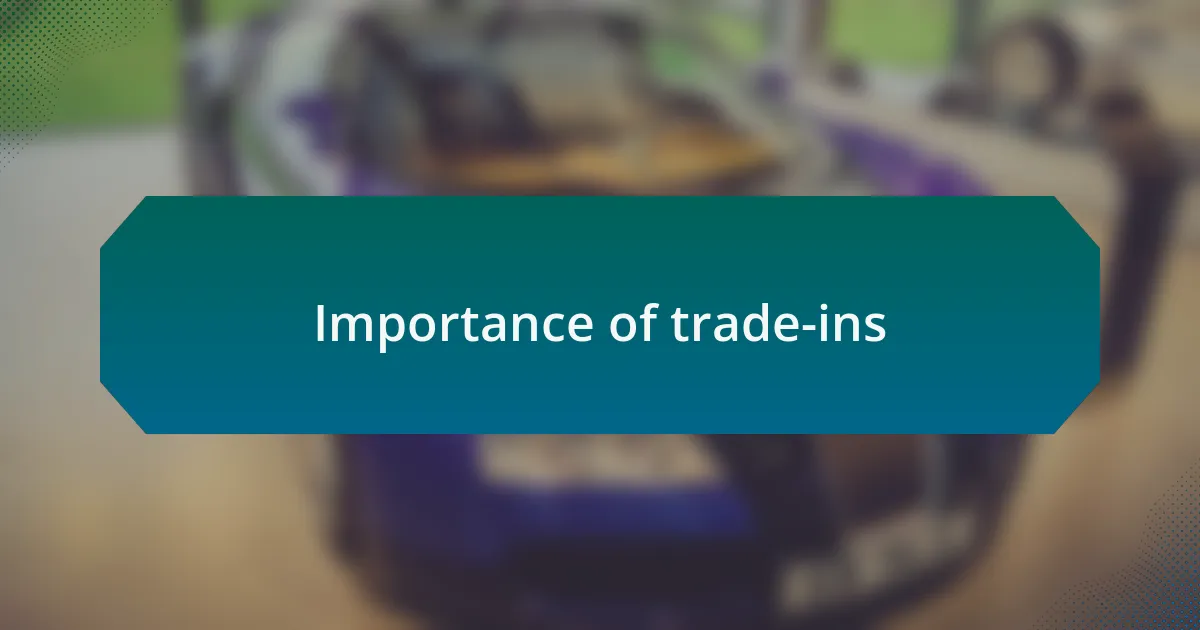
Importance of trade-ins
Trade-ins play a crucial role in the luxury car market, serving as a bridge between the past and future ownership experiences. I vividly recall trading in my first luxury vehicle; it not only eased the financial burden of my new purchase but also gave me a sense of closure. Have you ever thought about how letting go of an old car can symbolize moving forward in life?
Moreover, trade-ins often allow buyers to leverage their previous vehicle’s value for something more fitting to their evolving tastes. When I exchanged my sporty coupe for a spacious SUV, the trade-in helped cover the price difference without breaking the bank. Isn’t it interesting how such exchanges can lead to a smoother transition into a new era of driving?
In addition, the process of trading in offers an opportunity to enhance the overall buying experience. I appreciate how dealerships often provide competitive trade-in values that factor in the vehicle’s condition and market demand, making the transaction feel fair and transparent. How can you negotiate a better deal if you don’t fully understand the value of your current car?
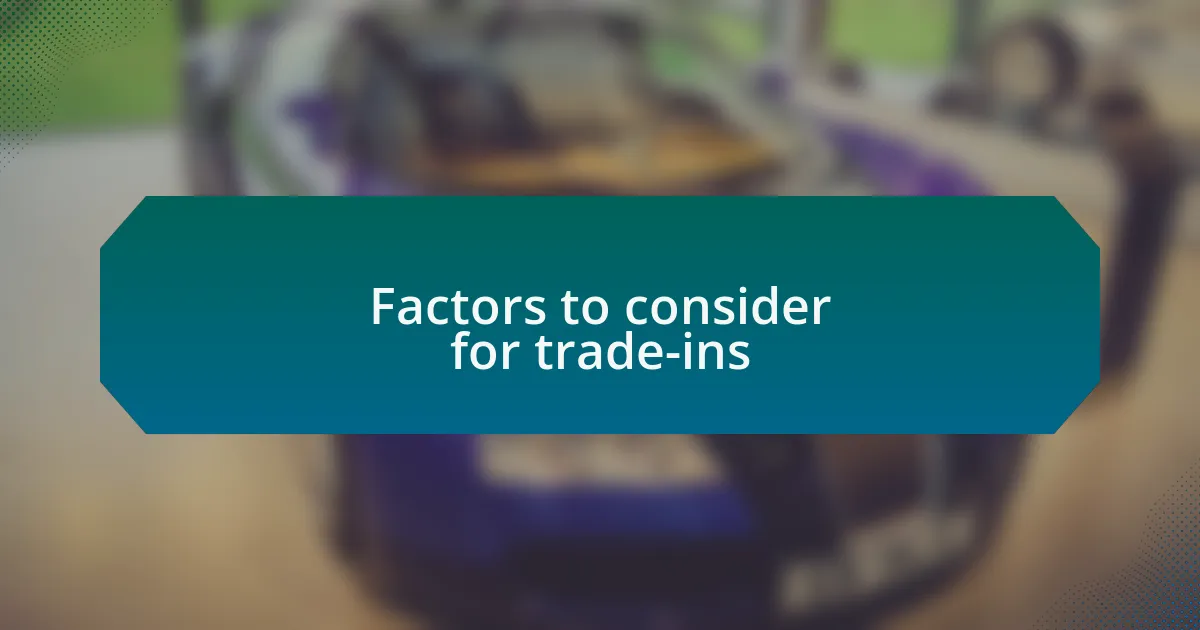
Factors to consider for trade-ins
When considering a trade-in, one of the most critical factors is the condition of your vehicle. I remember the time I had to decide whether to fix a few minor cosmetic issues on my trade-in. In the end, investing a bit in repairs helped increase its value significantly at the dealership. Isn’t it fascinating how a little effort can yield better financial returns?
Another essential element to keep in mind is the market demand for your particular model. I once owned a luxury sedan that, surprisingly, was in high demand. I was able to negotiate a better trade-in value simply because I knew how sought-after it was at that moment. Have you ever considered how timing can play such a vital role in getting the most out of your vehicle?
Lastly, understanding the vehicle history report can greatly influence your trade-in experience. During my last trade-in, I was upfront about my car’s previous accidents and service history. This transparency not only built trust with the dealer but also helped me secure an offer that reflected its true condition. How important do you think honesty is in such negotiations?
Assessing your vehicle’s value
When it comes to assessing your vehicle’s value, considering its market appeal is crucial. I recall one instance where a friend’s SUV, featuring unique customizations, surprised us all by fetching a premium price. Wouldn’t it be interesting to gauge how the right features can transform your car’s worth?
The condition of the interior and exterior is equally important. After keeping my convertible spotless and regularly maintained, I was amazed at how the little details, like a pristine leather interior, made it stand out. Have you noticed how a clean, well-kept car tells a story of care and investment?
Another factor to consider is mileage – it can significantly impact trading value. I learned firsthand that when I traded in my high-mileage vehicle, it didn’t get the love I expected. Have you thought about how keeping track of mileage can play a key role in making your vehicle more appealing to potential buyers?
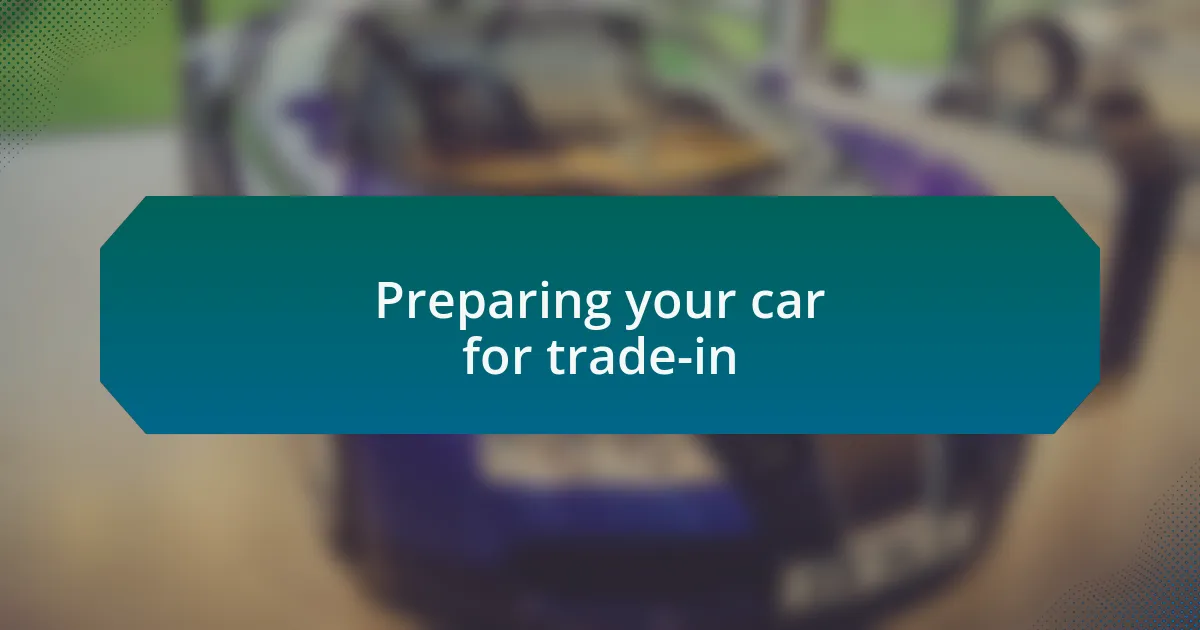
Preparing your car for trade-in
To prepare your car for trade-in, I always start with a thorough cleaning—inside and out. The first time I cleaned my car before a trade-in, I noticed how much more inviting it looked. Have you ever felt that rush when a car shines as if it’s brand new? A detailed wash and vacuum can instantly boost its appeal.
Next, I recommend addressing minor repairs. I once put off fixing a small dent on my car’s door, thinking it wouldn’t matter much. However, during the trade-in inspection, the dealer pointed it out, and I realized that those imperfections can leave a lasting impression. Would you want to undervalue your car over a quick fix?
Lastly, gathering all relevant paperwork, from service records to the title, is essential. I learned this the hard way when I couldn’t locate crucial documents, which stalled my trade-in process. How frustrating it can be to miss out on a good deal just because of missing paperwork! Having everything organized not only smooths the process but also projects diligence to potential buyers.
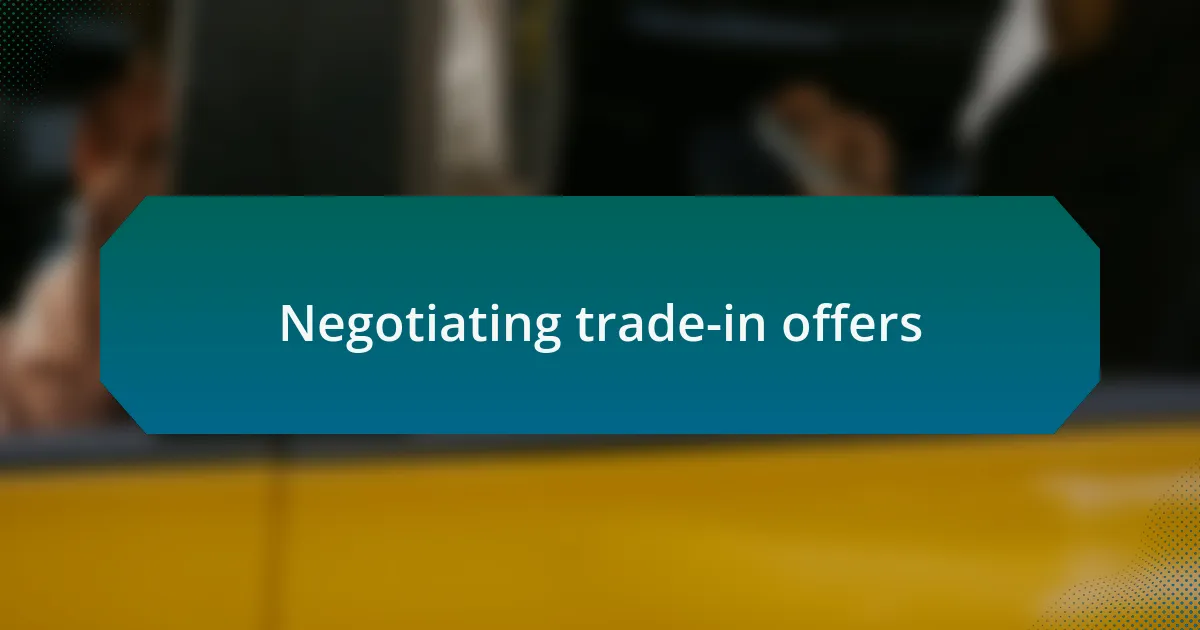
Negotiating trade-in offers
When negotiating trade-in offers, I always do my homework first. I remember the time I went into a dealership armed with my research on comparable models and their market values. It felt empowering to step into that negotiation, knowing exactly what my car was worth. Don’t you think having that confidence can make all the difference?
I also find it crucial to remain calm and composed during the negotiation. I once got caught up in the excitement and ended up accepting an offer that was lower than I expected. If only I had taken a moment to breathe and reconsider my position. Have you ever rushed into a decision only to regret it later? Taking a pause allows you to evaluate the offer without the pressure of the moment clouding your judgment.
Additionally, I believe in the power of timing. Whenever possible, I wait until the end of the month when dealers are trying to hit sales targets. There was a time when I traded in my SUV right before the month’s end and secured a significantly better deal. Isn’t it fascinating how timing can change the game in negotiations? It’s all about being strategic!
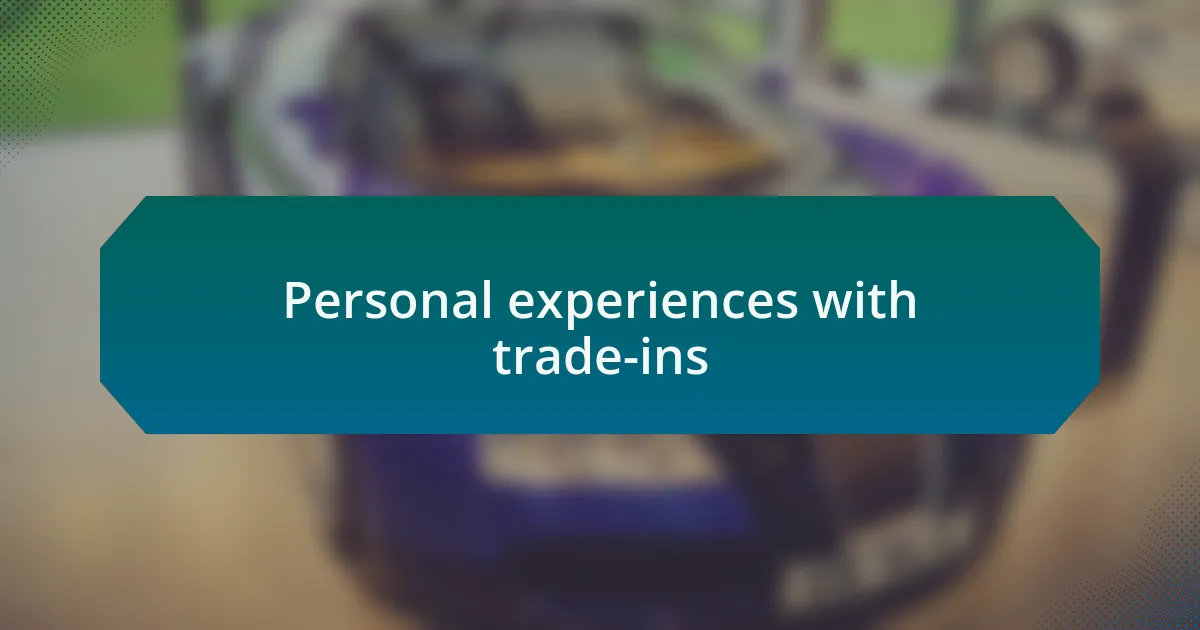
Personal experiences with trade-ins
When it comes to trade-ins, I always recall my first experience—a whirlwind of emotions. I was trading in my trusty sedan for a luxury model I’d been eyeing. As I handed over the keys, I felt a mix of excitement and nostalgia. It dawned on me how a car can be more than just a vehicle; it’s a repository of memories. Have you ever felt that bittersweet tug when saying goodbye to something that’s accompanied you on countless journeys?
I also learned the importance of presentation. One time, I meticulously cleaned and detailed my vehicle before the trade-in. When the dealer saw it in pristine condition, their eyes lit up, and I could almost see dollar signs in their mind. This experience taught me that how you present your car can completely influence the trade-in value. Have you thought about what your car’s appearance says about its worth?
Lastly, I can’t stress enough the benefit of honest communication. I once shared my vehicle’s service history openly with a dealer, which led to a more transparent negotiation. That openness fostered trust, and in the end, I received an offer I felt truly valued my car. Have you found that being straightforward in negotiations enhances the experience?